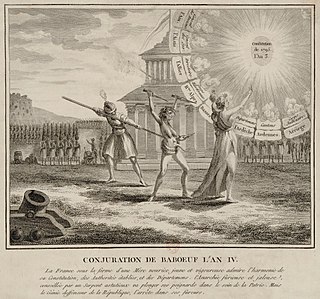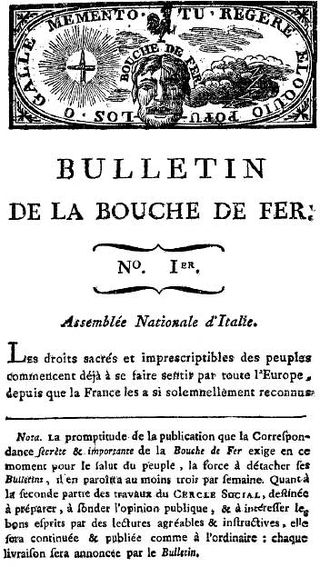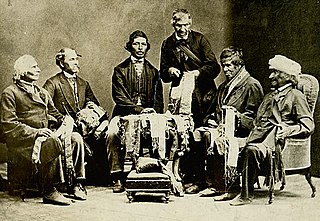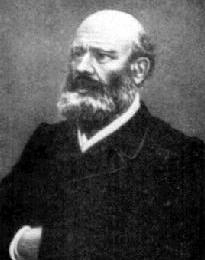
The French Revolution was a period of political and societal change in France that began with the Estates General of 1789, and ended with the coup of 18 Brumaire on November 1799 and the formation of the French Consulate. Many of its ideas are considered fundamental principles of liberal democracy, while its values and institutions remain central to modern French political discourse.
A Jacobin was a member of the Jacobin Club, a revolutionary political movement that was the most famous political club during the French Revolution (1789–1799). The club got its name from meeting at the Dominican rue Saint-Honoré Monastery of the Jacobins. The Dominicans in France were called Jacobins because their first house in Paris was the Saint Jacques Monastery.

François-Noël Babeuf, also known as Gracchus Babeuf, was a French proto-communist, revolutionary, and journalist of the French Revolutionary period. His newspaper Le tribun du peuple was best known for its advocacy for the poor and calling for a popular revolt against the Directory, the government of France. He was a leading advocate for democracy and the abolition of private property. He angered the authorities who were clamping down hard on their radical enemies. In spite of the efforts of his Jacobin friends to save him, Babeuf was executed for his role in the Conspiracy of the Equals.

The Directory was the governing five-member committee in the French First Republic from 26 October 1795 until 10 November 1799, when it was overthrown by Napoleon Bonaparte in the Coup of 18 Brumaire and replaced by the Consulate. Directoire is the name of the final four years of the French Revolution. Mainstream historiography also uses the term in reference to the period from the dissolution of the National Convention on 26 October 1795 to Napoleon's coup d’état.
This glossary of the French Revolution generally does not explicate names of individual people or their political associations; those can be found in List of people associated with the French Revolution.
Augustin Alexandre Darthé was a French revolutionary.

Filippo Giuseppe Maria Ludovico Buonarroti, more usually referred to under the French version Philippe Buonarroti, was an Italian utopian socialist, writer, agitator, freemason, and conspirator; he was active in Corsica, France, and Geneva. His History of Babeuf’s Conspiracy of Equals (1828) became a quintessential text for revolutionaries, inspiring such socialists as Blanqui and Marx. He proposed a mutualist strategy that would revolutionize society by stages, starting from monarchy to liberalism, then to radicalism, and finally to communism.

The Conspiracy of the Equals of May 1796 was a failed coup d'etat during the French Revolution. It was led by François-Noël Babeuf, who wanted to overthrow the Directory and replace it with an egalitarian and proto-socialist republic, inspired by Jacobin ideals.
The history of communism encompasses a wide variety of ideologies and political movements sharing the core principles of common ownership of wealth, economic enterprise, and property. Most modern forms of communism are grounded at least nominally in Marxism, a theory and method conceived by Karl Marx and Friedrich Engels during the 19th century. Marxism subsequently gained a widespread following across much of Europe, and throughout the late 1800s its militant supporters were instrumental in a number of unsuccessful revolutions on that continent. During the same era, there was also a proliferation of communist parties which rejected armed revolution, but embraced the Marxist ideal of collective property and a classless society.

Sylvain Maréchal was a French essayist, poet, philosopher and political theorist, whose views presaged utopian socialism and communism. His views on a future golden age are occasionally described as utopian anarchism. He was editor of the newspaper Révolutions de Paris.

The Society of the Friends of Truth, also known as the Social Club, was a French revolutionary organization founded in 1790. It was "a mixture of revolutionary political club, the Masonic Lodge, and a literary salon". It also published an influential revolutionary newspaper, the Mouth of Iron.

While Karl Marx and Friedrich Engels defined communism as a political movement, there were already similar ideas in the past which one could call communist experiments. Marx himself saw primitive communism as the original hunter-gatherer state of humankind. Marx theorized that only after humanity was capable of producing surplus did private property develop.

Jean-Jacques Pillot was a French revolutionary and republican communist. He participated in the Revolution of 1848 and in the Paris Commune of 1871.
Neo-Babouvism is a revolutionary socialist current in French political theory and action in the 19th century. It hearkened back to the Conspiracy of the Equals of Gracchus Babeuf and his associates, who tried to overthrow the Directory at the end of the French Revolution. After Babeuf's execution, his programme of radical Jacobin republicanism and economic collectivism was propagated by Philippe Buonarroti, who had been associated with the Conspiracy of the Equals and survived. Buonarroti's writings influenced many French revolutionaries in the 1830s and 1840s, among them Théodore Dézamy, Richard Lahautière, Albert Laponneraye and Jean-Jacques Pillot.
Alexandre Théodore Dézamy was a French socialist, a representative of the Neo-Babouvist tendency in early French communism, along with Albert Laponneraye, Richard Lahautière, Jacques Pillot and others. He was also an early associate of Louis-Auguste Blanqui. He and his colleagues formed a link between the extreme left wing of the French Revolution (Babeuf) and Marxism.

The Left in France The distinction between left and right wings in politics derives from the seating arrangements which began during the Assemblee Nationale in 1789. During the 1800s, left largely meant support for the Republic, whereas right largely meant support for the monarchy.
The Panthéon club was a French revolutionary political club founded in Paris the 6 November 1795. Its official name was Reunion of Friends of the Republic. It was composed of former terrorists and unconditional Jacobins coming from the petite bourgeoisie.

The Communist League was an international political party established on 1 June 1847 in London, England. The organisation was formed through the merger of the League of the Just, headed by Karl Schapper, and the Communist Correspondence Committee of Brussels, Belgium, in which Karl Marx and Friedrich Engels were the dominant personalities. The Communist League is regarded as the first Marxist political party and it was on behalf of this group that Marx and Engels wrote the Communist Manifesto late in 1847. The Communist League was formally disbanded in November 1852, following the Cologne Communist Trial.
The League of the Just or League of Justice was a Christian communist international revolutionary organization. It was founded in 1836 by branching off from its ancestor, the League of Outlaws, which had formed in Paris in 1834. The League of the Just was largely composed of German emigrant artisans.
Communism has been a part of French politics since the early 20th century at the latest. It has been described as "an enduring presence on the French political scene" for most of the 20th century.











